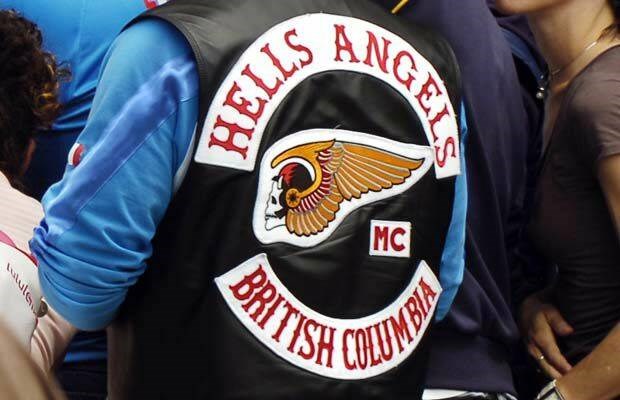VANCOUVER — B.C.’s highest court has ordered the government seizure of three Hells Angels clubhouses, agreeing with the director of civil forfeiture that the properties would likely be used in future for criminal activity.
The Court of Appeal overturned a B.C. Supreme Court ruling from 2020 that allowed the motorcycle club to keep its clubhouses in Nanaimo, East Vancouver and Kelowna and said part of the Civil Forfeiture Act relating to future crimes was unconstitutional.
Appeal Court Justices Mary Newbury, Christopher Grauer and Leonard Marchand said the findings of Justice Barry Davies were “tainted” because he used an elevated standard of proof and refused to admit facts from previous criminal cases against several Hells Angels.
Davies “also committed palpable and overriding errors of fact in declining to draw inferences clearly supported by the record,” the justices said in their ruling, released Wednesday.
The Hells Angels have 10 chapters around B.C., each with its own clubhouse for weekly “church” meetings and special events sometimes attended by hundreds of leather-vested Harley-riding members.
The government agency first sought forfeiture of the Nanaimo clubhouse more than 15 years ago after a major police investigation. In 2012, the director went after the East End and Kelowna clubhouses, arguing all three would likely be used for unlawful activity in the future, just as they had been in the past.
Evidence in the year-long civil trial supported that claim, the Appeal Court said.
“We are satisfied that the inference clearly arises that members’ engagement in unlawful activities was facilitated through access to information gathered surreptitiously at the clubhouses, and protection from surveillance and detection by law enforcement offered by the clubhouses,” the three justices said.
“Indeed, the most logical and reasonable inference to be drawn from the evidence is that the clubhouses were designed and outfitted at least in part for that very purpose. We are further satisfied that such use of the clubhouses was likely to continue.”
The rulings also said the clubhouses “were likely to be used in a way that enhanced or facilitated the engagement by members of the relevant chapters in unlawful activity.”
“The clubhouses therefore constituted ‘instruments of unlawful activity’ in accordance with the future use definition and were subject to forfeiture.”
In his June 2020 ruling, Davies said the director of civil forfeiture had not proven his claim that the clubhouses “play an important role in enabling and empowering members of the Hells Angels to engage in serious crime for financial gain.”
The B.C. government filed an appeal that was heard in June 2022. The director’s lawyer, Brent Olthuis, told Newberry, Grauer and Marchand that there are grounds to reverse Davies’ findings and simply order the properties in East Vancouver, Nanaimo and Kelowna be forfeited to the government without a costly second trial.
The appeal justices also said that Davies had focused on the director’s attempt to prove that the Hells Angels is a worldwide criminal organization, something that wasn’t necessary for the clubhouses to be forfeited.
“We observe that the unlawful activity in question need not be corporate in nature,” the justices said.
Crimes committed by individual HA members and other evidence about the bikers’ “penchant for secrecy” and “preoccupation with rats and snitches” were enough to make the director’s case, they said.
“If such activity on the part of any member(s) is enhanced or facilitated through use of the clubhouse, then, in our view, the definition is met. As the judge noted, past unlawful activity was established by the evidence, and this included criminal activity on the part of members of all three chapters associated with the clubhouses.”
Convictions against bikers linked to the chapters include manslaughter, extortion, trafficking and possession of restricted firearms.
Former Toronto Hells Angel-turned-police agent Dave Atwell and Micheal Plante, who infiltrated the East End Angels for police in B.C., testified for the director of civil forfeiture at the trial. Atwell said he witnessed talk of cocaine deals inside the Toronto clubhouse and said “covert conversations” took place there so police couldn’t intercept them. Plante also testified about drug deals and acts of violence plotted at the clubhouse.
B.C. Hells Angels Rick Ciarniello and Damiano Dipopolo took the stand for their club.
Ciarniello did not respond to a request for comment Wednesday about a possible appeal.
One of the lawyers for the Hells Angels, Greg DelBigio, said he was unable to comment.
Civil forfeiture director Phil Tawtel also said he couldn’t comment on the ruling.
The Appeal Court ordered the Hells Angels defendants to pay the director’s legal costs for the appeal.
And the ruling said that the land titles for all three clubhouses should be transferred to the province.
The current assessed value of all three clubhouses is $3,094,500 — likely a fraction of the legal bills paid in this case since 2007.
“Any monies realized from the sale of the clubhouses must be paid into the civil forfeiture account,” the justices said.



